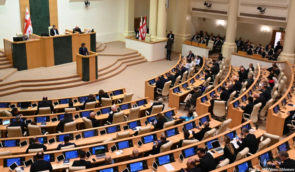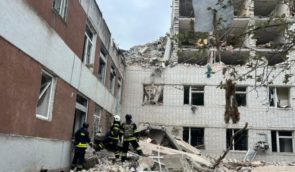Human Rights Advocate: “Red Cross” as a Tool in Information Warfare
“It is cynical to use the name of Red Cross as an instrument of information warfare,” writes human rights advocate Olexandra Matviichuk on her Facebook page. Her comment was in reference to recent events where the Moscow Red Cross submitted a statement to The Hague regarding the alleged crimes of Ukrainian authorities in the ATO.
“Cynical lies are an all too familiar communication style of Russia’s authoritarian government and entities affiliated with it,” says Matviichuk.
The ICC has allegedly accepted the Moscow Red Cross statement from December 30th on what is claimed to be Ukrainian crimes in Donetsk and Luhansk regions. This was reported by RIA Novosti with reference to the head of the Moscow Red Cross office, lawyer Igor Trunov.
“We have received a response from the Chief Prosecutor of the International Criminal Court in The Hague, that our statement on the investigation of crimes against humanity committed by officials of Ukraine was accepted for consideration and started being discussed”, said Trunov.
Matviichuk calls it the “fruit of the sick imagination of Russian propaganda” and explains why:
“Firstly, the International Committee of the Red Cross (ICRC) strictly adheres to its principles of neutrality and impartiality. This reputation gained through years of work allows the ICRC to assist the victims of conflicts (for example, to have access to POW camps). In order to preserve this reputation, the ICRC does not take sides or reveal any information received during operations. As a reminder, in 1995 ICRC president Cornelio Sommaruga publicly admitted that during World War II the Red Cross concealed information about mass executions and appalling conditions in the concentration camps, despite being well informed about the Holocaust.
Secondly, the ICRC and the ‘Moscow Red Cross’ are two different organizations, which are independent from each other. The ‘branch’ is not subject to the ICRC. National Red Cross societies, of which there are over 170, are established in states party to the Geneva Conventions in order to assist their military medical services in case of war. Therefore, as a rule, national Red Cross societies are highly dependent on the state for their policies and assessments. Hence, the difference in status. No national society of any country can carry out the mission of the International Committee of the Red Cross, namely, to be a neutral, impartial and independent intermediary between the parties to the conflict.
Thirdly, Ukraine is not under the International Criminal Court’s (ICC) jurisdiction, as it has not yet ratified the Rome Statute. I would like to note separately that the ICC, under no circumstances, is a substitute for a national judicial system, as it operates under the principle of complementarity. That is, even when Ukraine becomes a member, the ICC may only begin its investigation when national authorities are unwilling or unable to investigate or initiate criminal proceedings properly.
Therefore, the ‘Moscow branch of the Red Cross’ might as well send their materials to the Pope. I’d have equal success suggesting that they stop using the name ‘Red Cross’ as an instrument of information warfare.”








